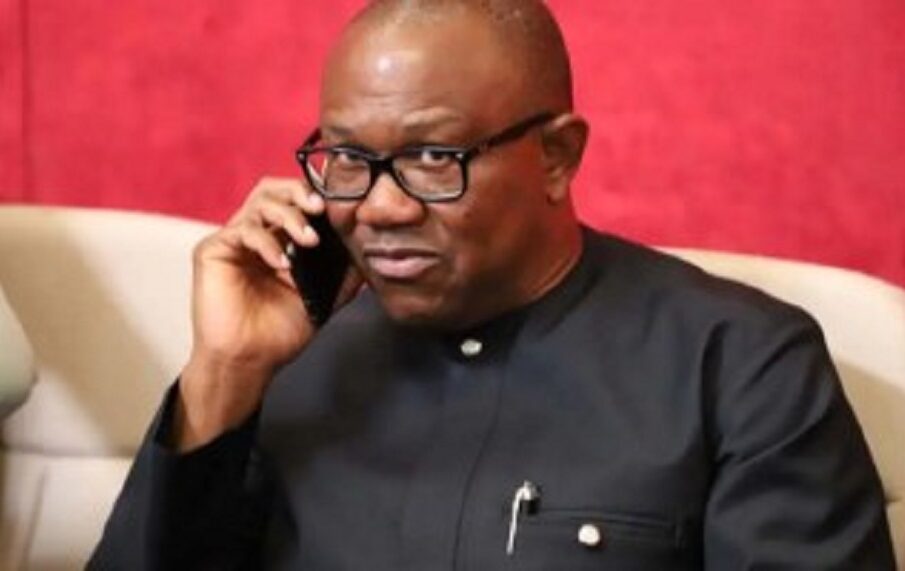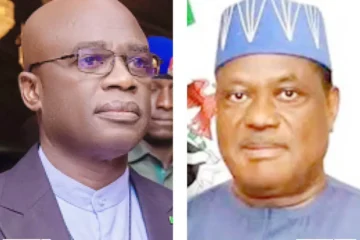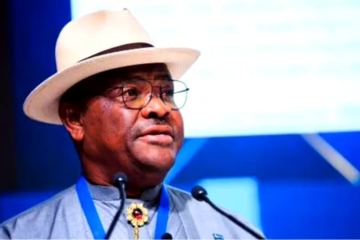
Peter Obi
By Simeon Kolawole
How time flies! I met Mr Peter Obi for the first time almost 19 years ago — in August 2003 to be specific. He had come to the THISDAY head office in Apapa, Lagos state, on a visit to Mr Olusegun Adeniyi, then Sunday Editor. I was the Saturday Editor. As I saw him in front of Adeniyi’s door, I recognised him instantly: his face had been all over the papers. He was acclaimed to have won the Anambra governorship poll on the platform of the All Progressives Grand Alliance (APGA) but the Independent National Electoral Commission (INEC), under the guidance of the Peoples Democratic Party (PDP), had done some magic with the figures and declared Dr Chris Ngige as the winner.
We exchanged pleasantries and phone numbers. I thereafter went to see him in his office at Apapa. We had a very long, engaging conversation. Something struck me about him: his modesty. For a billionaire, he had no airs. He told me how he made his money through the franchise of choice wines and spirits, among other businesses. He said he decided to go into politics the day he saw “Bakassi Boys” (the forebears of Unknown Gunmen) burn a man alive in Onitsha, Anambra state. He told himself “lunatics have taken over the asylum”, that something needed to be done to restore sanity to the society. We became friends and I would easily say I was one of the closest journalists to him.
As he now seeks to be president of Nigeria, he is, without a doubt, eminently qualified. He has paid his dues to the development of our democracy. During our conversation that day, we discussed his struggles over the 2003 governorship poll. He was so sure he would win his petition at the tribunal. “My position is that the election was held, it was peaceful and there was no rigging whatsoever,” he explained to me. “But I am saying the wrong results were declared. We have the result sheets from all the local governments signed by all the returning officers. What INEC declared in Awka was totally different. I am asking the tribunal to declare me governor based on the authentic results.”
The following weekend, I “officially” enlisted in the campaign for electoral justice in Anambra state through my weekly column. The title of my first article on it was “The Man They Call the People’s Governor”. I highlighted the electoral banditry that took place in the state on April 19, 2003. But if I thought getting justice was going to be a walk in the park, I was awfully mistaken. As a delay tactic, PDP had lined up 425 witnesses. APGA had 45 and INEC 12. That was a total of 482! It took two years for the tribunal to listen to all the testimonies and take evidence. I was so exasperated at some point that I asked in one of my articles: “Will Peter Obi Ever Get Justice?” (THISDAY, December 20, 2004).
On August 12, 2005, the tribunal finally delivered judgment in Obi’s favour. For the record, he filed the petition on May 16, 2003. The first phase lasted for well over two years. His lawyers established before the tribunal that the results declared by INEC across the 21 local government areas were written by the same person. The police presented a handwriting expert who testified against INEC and PDP. That was the first election result to be overturned in the fourth republic. PDP went on to file an appeal and this lasted for another seven months. On March 15, 2006, the Court of Appeal ruled in Obi’s favour. In those days, governorship petitions did not go beyond the Court of Appeal.
At long last, Obi was inaugurated as governor of Anambra state on March 17, 2006. Effectively, Obi waited for almost three years to get justice over a four-year term. But the “owners” of Anambra were not sleeping. Seven months after his inauguration, they struck again. They organised an illegal impeachment on November 2, 2006. Obi sought justice and won his case in the High Court as well as the Court of Appeal. Both courts declared that the house did not form the required 2/3 quorum and the recognised place of legislative sitting is the chamber of the house of assembly, not someone’s dining room. Obi was re-instated on February 9, 2007. But, as Nigerians say, “trouble no dey finish”.
Another issue came up: would Obi leave office in 2007 after only one year, whereas the constitution stipulates a minimum of four years? He headed for the courts again for the constitutional definition of a “term”. INEC, under Prof Maurice Iwu, did everything to get rid of him: they conducted an election, excluded Obi and installed Andy Uba on May 29, 2007. The Supreme Court ruled on June 14, 2007 that Obi’s tenure would lapse in March 2010 — on the fourth anniversary of his inauguration. That was the start of off-cycle governorship polls and why Ekiti, Osun, Bayelsa, Kogi, Edo, Imo and Ondo don’t elect governors during the general election. Now you know the origin.
That was not the end. As Obi’s first term drew to a close, Uba went all the way to the Supreme Court asking to be declared “governor-in-waiting” based on the 2007 victory organised for him by Iwu’s INEC. He argued that the victory was still valid. There were real fears that Uba might finally have his way, but Obi won again. Having won landmark legal battles, Obi can creditably claim to have contributed a decent quota to the constitutional development of our democracy. Having received education home and abroad and having run businesses successfully, Obi can claim to have what it takes to become the next president. His resume is not inferior to that of any other candidate.
But Obi’s candidature, which has been gathering momentum since he left the PDP and joined the Labour Party (LP), is getting hit by the day. His strength is becoming his weakness: the fan base. His followership has clearly caught fire and is spreading not just on social media but also on the streets in many parts of the country. But some of his overzealous supporters are so unruly that this is turning out to be a baggage for him. It is putting off a lot of people. It is a bit of a bitter-sweet phenomenon: he is gaining more supporters partly because of the aggressiveness of his diehard fans but this aggression is now going overboard and becoming nauseating to even some of his admirers.
First, some of them are using religion to promote him. They are proposing that the structure of the Catholic Church in Nigeria, to which he belongs, should be used as his political machinery. This is supposed to be a response to concerns that Obi needs a structure to reach the grassroots to be able to win the presidential election. There is also the subtext that he is the only Christian among the top candidates and Christians should rally around him. This is absolutely silly. Although religion may sell in some parts of the country, I bet that no-one has ever been elected president by adherents of their faith alone. In a multi-cultural society like ours, we need to be careful with this kind of campaign.
Also, his supporters are creating and circulating all sorts of falsehood on social media in an extremely dishonest attempt to market a candidate they project as an honest man. The contradiction. They have come up will all sorts of concoctions — inventing and attributing “endorsement” quotes to Alhaji Muhammad Sanusi II and Sultan Muhammadu Sa’ad Abubakar, whom they would otherwise call “Fulani jihadists”. They were circulating the fiction that Obi invested $20 million of Anambra’s money in SabMiller and it is now worth $100 million. The Anambra state government was forced to clarify that the investment and returns, either in naira or the dollar value, were grossly exaggerated.
More so, some of Obi’s supporters, especially the ones on social media, are awfully ill-mannered. I admit that social media takes some people to Cloud 9 and there is not much Obi can do to rein in those who don’t directly work for him. It is, indeed, to Obi’s credit that after his supporters had gone on Twitter to celebrate and gloat over the misfortune that befell Senator Ike Ekweremadu and his wife in the UK over alleged human trafficking and an attempt to harvest the organ of a minor (they deny the allegations), Obi tweeted a message of empathy to them. That is the Peter Obi that I have known for nearly 19 years. Ekweremadu is not his fan but Obi is a civil and decent human being.
Furthermore, Obi’s fans are overmarketing him and portraying him as being beyond reproach. They attack anyone who raises any questions about him. We had a similar experience with Candidate Muhammadu Buhari’s fans in 2015. But supporters need to be real: no human being is perfect. Only God is. This “stainless steel” marketing strategy is unnecessary: Obi can be sold based on his pedigree, his credentials, his resilience and his modesty. As his candidature becomes more viable, he and his camp should expect more scrutiny from his opponents. That is the nature of politics. They cannot shout down everyone or gloss over everything. It will not work. Obi needs professional help.
Herein lies Obi’s dilemma: should he keep riding on the waves of these lies and toxins to gain more fans — thereby undermining his own credentials as an “honest and decent man” — or should he call his supporters to order and risk losing the momentum — even if it is being propelled by fake news and abuse? No politician wants to lose supporters, so the temptation to allow the supporters to keep running riot will always be there. Obi himself, it has to be said, also has issues with his statistics and claims and has become a nightmare for fact checkers, but my assumption is always that this is mostly because of memory lapse on his part rather than a genuine attempt to mislead or misinform.
To be sure, Buhari benefitted from overmarketing in his 2015 presidential run. It was one fabrication after the other every day of the week. In my article on the disturbing trend, entitled “Buhari and the Burden of Expectations” (THISDAY, January 25, 2015), I wrote: “Buhari’s growing popularity, particularly on the social media, scares me at times. In an attempt to market him, some chaps have gone overboard, designing and spreading beautiful disinformation about him such that even the former head of state has had to come out to clarify one.” There are people who contend that it was Twitter that made Buhari president in 2015 and they are trying to replicate it with Obi in 2023.
Finally, Obi should worry about the narrow notion that he can become president with sectional votes. I know that many Nigerians genuinely support him because they are dissatisfied with the status quo and desire a fresh breath. They see him as the best of the lot. But those pushing the regional and religious agenda need to reconsider their messaging. Those who wrote the constitution are not stupid. To become president, you need more than the support of one sect or one section. Otherwise, Buhari would have won in 2003, 2007 or 2011. It was not until he built viable bridges across the divides that he won in 2015. Good enough, Obi still has the time to sanitise his campaign.
Culled from TheCable











